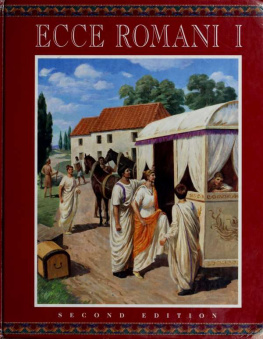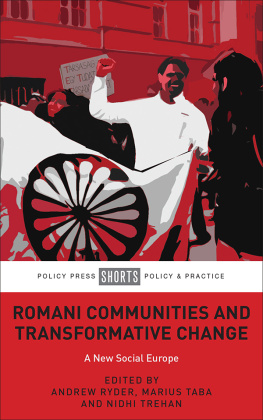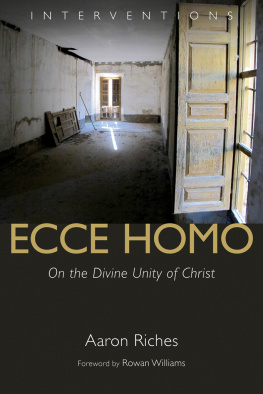Scottish Classics Group - Ecce Romani : a Latin reading program
Here you can read online Scottish Classics Group - Ecce Romani : a Latin reading program full text of the book (entire story) in english for free. Download pdf and epub, get meaning, cover and reviews about this ebook. year: 0, genre: Science / Home and family. Description of the work, (preface) as well as reviews are available. Best literature library LitArk.com created for fans of good reading and offers a wide selection of genres:
Romance novel
Science fiction
Adventure
Detective
Science
History
Home and family
Prose
Art
Politics
Computer
Non-fiction
Religion
Business
Children
Humor
Choose a favorite category and find really read worthwhile books. Enjoy immersion in the world of imagination, feel the emotions of the characters or learn something new for yourself, make an fascinating discovery.
- Book:Ecce Romani : a Latin reading program
- Author:
- Genre:
- Year:0
- Rating:3 / 5
- Favourites:Add to favourites
- Your mark:
- 60
- 1
- 2
- 3
- 4
- 5
Ecce Romani : a Latin reading program: summary, description and annotation
We offer to read an annotation, description, summary or preface (depends on what the author of the book "Ecce Romani : a Latin reading program" wrote himself). If you haven't found the necessary information about the book — write in the comments, we will try to find it.
Ecce Romani : a Latin reading program — read online for free the complete book (whole text) full work
Below is the text of the book, divided by pages. System saving the place of the last page read, allows you to conveniently read the book "Ecce Romani : a Latin reading program" online for free, without having to search again every time where you left off. Put a bookmark, and you can go to the page where you finished reading at any time.
Font size:
Interval:
Bookmark:





At first you will meet the members of a Roman family, and as you continue reading you will meet mythological and historical characters that meant much to the Romans and remain part of our cultural heritage today. You will be introduced to a vast and colorful world of ancient Mediterranean and European civilizations that included peoples of many different cultures and social levels, ranging from slaves to emperors. A Roman Family Within this vast world, the focus of your attention will be the daily life of a typical upper-class Roman family, consisting of a father named Cornelius, a mother named Aurelia, a son named Marcus, a daughter named Cornelia, and a young boy named Sextus, who is a ward of the family. You will follow the development of Marcus and Cornelia from late childhood to the beginning of their lives as mature Romans. Baiae The Latin stories you will be reading about this family take place in A.D. 80, the year following the destruction of Pompeii by the eruption of Mount Vesuvius.
The familv lives in the great metropolis of Rome, but when you first meet them it is summertime, and they are living at their country home near Baiae in Campania (see map on page xii). The family's country house has a courtyard surrounded by columns with a garden inside it, living quarters for the owner's family, and various structures needed for farming, including rooms for slave laborers. Baiae, on the Bay of Naples, was a fashionable resort for wealthy Romans, many of whom built splendid country houses or villas there. The shoreline of the Bay of Naples was ringed with villas built on terraces so that their inhabitants could enjoy the beauty of the sparkling waves and the steep cliffs of the islands in the bay. On the terraces the Romans planted gardens and cool arbors of trees under which they could refresh themselves in the heat of the day. Along the shore they built fish ponds, which were flushed daily by the tides.
Baiae was the most famous of many resorts that grew up around the Bay of Naples. Its original attraction was a series of thermal springs, to which Romans went who were suffering from arthritis and other diseases. So pleasant were the hot waters that they lured the fashionable crowd, who came to see, and to be seen, in the constant series of parties and entertainments that made up the "Season" in this "Garden of Italy." Some Romans xii INTRODUCTION I I  / At i las C\_ ^O Pompeii Sinus Neapolitan 1 Campania-Baiae such as the father of our family probably did not join in these luxurious entertainments but rather came to Baiae to escape the summer heat and humidity of the city and to enjoy the peace, quiet, and simple life of a country house and farm. The Latin Language As you read stories about the Roman family in this book, you will be learning Latin, a language that gave birth to a number of languages that are still used today, including Spanish, Portuguese, French, Italian, and Rumanian. These modern languages are known as Romance languages, because they come from the language used by the ancient Romans. Speakers of these languages find it very useful to know something about the Latin origins of their language.
/ At i las C\_ ^O Pompeii Sinus Neapolitan 1 Campania-Baiae such as the father of our family probably did not join in these luxurious entertainments but rather came to Baiae to escape the summer heat and humidity of the city and to enjoy the peace, quiet, and simple life of a country house and farm. The Latin Language As you read stories about the Roman family in this book, you will be learning Latin, a language that gave birth to a number of languages that are still used today, including Spanish, Portuguese, French, Italian, and Rumanian. These modern languages are known as Romance languages, because they come from the language used by the ancient Romans. Speakers of these languages find it very useful to know something about the Latin origins of their language.
In addition, even though the English language is predominantly derived from Germanic dialects and not from Latin, as much as sixty percent of English vocabulary comes from Latin. Many words of Latin origin came into English through French, which was spoken by the Normans, who conquered the English in 1066. Many other Latin words came into English during the revival of classical learning in the Renaissance and Enlightenment (1550 and following), and Latin words have come and continue to come into English usage in scientific, medical, and legal terminology. Xlll As you begin to read the Latin stories in this book, you will notice many words that are similar to English words because the English words are derived from the Latin ones. You will also notice many differences between English and Latin, and you will come to appreciate how different languages have unique ways of expressing ideas. One big difference that you will notice right away between Latin and English usage is the fact that Latin does not have a definite article (English the) or indefinite articles (English // and an).
When you translate Latin into English, you will need to supply these articles. As you read the Latin stories you will discover many other similarities and differences between Latin and English (and between Latin and any other language you speak or know). The authors of these books would like to emphasize the word discover, because as you read the Latin stories you will be discovering for yourself how Latin works as a language and how to understand and translate it. Following the stories you will find formal explanations of how the language works. These explanations will help you visualize the way Latin sentences express meaning, and the}' will help you learn the elements or building blocks of the language.  The beautiful region of Campania has inspired artists over the centuries.
The beautiful region of Campania has inspired artists over the centuries. 
Font size:
Interval:
Bookmark:
Similar books «Ecce Romani : a Latin reading program»
Look at similar books to Ecce Romani : a Latin reading program. We have selected literature similar in name and meaning in the hope of providing readers with more options to find new, interesting, not yet read works.
Discussion, reviews of the book Ecce Romani : a Latin reading program and just readers' own opinions. Leave your comments, write what you think about the work, its meaning or the main characters. Specify what exactly you liked and what you didn't like, and why you think so.







